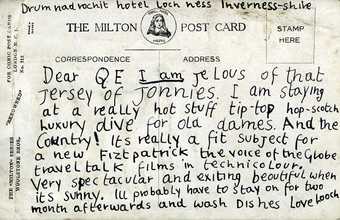It is always a wee bit dangerous to think you know an artist by the art, and some prefer to exclude peripheral biographical clutter from their interpretation or enjoyment of it. But letters, diaries, even hastily scribbled postcards can open up a whole new world. There is a good example deep in the Tate archive.
In the summer of 1943, a 21-year-old Lucian Freud spent a sunny spell in the Scottish highlands with two friends. During that time he made a fabulously intricate ink drawing, Loch Ness from Drumnadrochit, from the window of the Drumnadrochit Hotel. He also sent a postcard to his friend Elsie Nicholson, in which he wrote: “I am staying at a really hot stuff tip-top hop-scotch luxury dive for old dames. And the country! Its really a fit subject for a new Fitzpatrick the voice of the Globe traveltalk films in technicolour. Very spectacular and exiting beautiful when its sunny.”

Lucian Freud
Postcard to Elsie Nicholson 1943
Photo: Tate © Lucian Freud
It’s a great glimpse into a young Freud, not just because of the funny card, but for the charming misspellings and his childlike scrawl. They seem a world away from the tough rigorous paint we are used to seeing now. His tone is full of unfettered energy, but there is already a distinctive voice. The message is revealing for its filmic reference too. James Fitzpatrick was the popular American documentary filmmaker known for his Technicolor Fitzpatrick Traveltalks that included titles such as India on Parade (1937) and Yosemite the Magnificent (1941).
Reading his postcard now, we can imagine Freud’s piercing eyes sweeping a panoramic view of the Scottish countryside.
